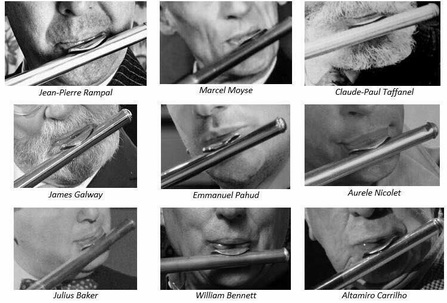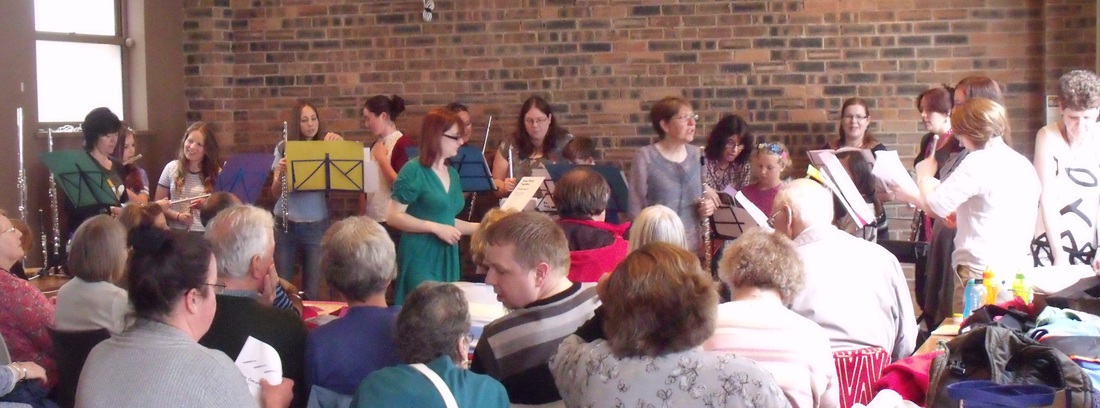|
Last night BBC Four showed the first episode of All Together Now: The Great Orchestra Challenge. Like Bake Off for musicians, this is a series where we follow several amateur orchestras through various rounds until a winner is decided (and gets to play at Proms in the Park). I wrote of my reservations about the idea when it was first announced, so it was with some hesitancy that I switched on last night.
I have to say I enjoyed most of the programme - it was lovely to hear the stories of the orchestras and some of the individuals who played and conducted them. It was particularly great to hear about how being part of the groups had enhanced people's lives, made them feel part of a community. It was fascinating to see how they worked in rehearsals, and responded to the professional coaching and intensive mentoring sessions, to hear them talk about practice (or lack of!) and the challenges of playing at a certain age, or when you've got long working hours and family to consider. Seeing/ hearing the different styles and characters of each group was really interesting, as was seeing/ hearing the progress they made over a month with the pieces they'd been challenged to learn. The competition element was kept fairly low-key, until right at the end, when each group performed their piece and there was the typical "we have to say goodbye to someone" line-up. I agree with this review from theartsdesk.com that this felt tacked-on, 'tacky and unnecessary'. Could we not have just followed the progress of all these amazing people across a few months? Could they not have all played in a concert at the end, celebrating amateur music-making and their achievements? Maybe that wouldn't have provoked as much interest as a competition. Classical music has been in the news for other reasons connected to competitions too. After the Olympics, there were questions around why there is so much more funding for sport than there is for the arts. Why 'elite' sport is seen as a good thing but 'elitism' in music isn't. That particular question grabbed my interest as a linguist - my initial thoughts are that it is in part down to the different usage of the terms. You just don't really hear anyone talking about 'elite' musicians in the same way as they do about elite athletes, even though the process of training is not actually that different or any less intense. Where the term is used, it's negative, around classical music being 'elitist' or for 'the elite' (although I have also seen some discussion about certain sports suffering from 'elitism' - debates around lack of access to particular sports to people coming from state schools, for example, which could also apply to music education in some areas). I think this is something that could make a good corpus linguistics study, to get some data around the usage of the words - maybe I'll set aside some time for a mini research project! I do wonder, though, if there is any connection between these views (and funding levels) and the fact that sport is generally competitive and music is generally not - not in quite such an obvious way, anyway. Music competitions exist, but the usual way for people to experience music is a performance/ concert, whereas the normal way of experiencing sport is to watch a competitive match or race. Do people just like the structure of competition, the tribalism of supporting a team? Is musical performance 'elitist' in a way that sporting competition (whilst involving an 'elite') is not?
0 Comments
This photo has been doing the rounds on the flutey internet recently (I don't know where it originates from, so apologies for the lack of credit). These are some of the best flautists of the last couple of hundred years, and in particular these are their embouchures - the shape they make/ made with their mouths when playing. If you'd like to look at lots of other embouchures, there's a web page full of them over here: http://www.larrykrantz.com/embpic.htm. The point is that there are all sorts of differences between them - how much lip is above/ below the flute, what angle the lips/ flute are at, all sorts... and of course their lips are naturally very different in the first place. I saw one of the above flute players at the weekend - at the British Flute Society 'Flutastique' Festival, which was celebrating the links between British and French flute playing, and William Bennett's 80th birthday. Looking around the event was a perfect demonstration of the idea that one size doesn't fit all! Watching the performers' recitals - all wonderful players with fantastic, but different, tones - you could see different embouchures, different ways of holding the flute and using the fingers, different ways and degrees of movement when they played. And then there were the hundreds of attendees - on the Friday morning we had a great warm-up session with Katherine Bryan, and although we were all aiming at the same thing, 'good' relaxed posture and playing a nice clear 'B', a glance across the room showed numerous permutations and combinations of posture, hand positioning and embouchure. The same variations were in evidence at the manufacturers' stalls where people were trying out different flutes and finding that some worked for them and some didn't. When you watch someone playing the instrument you play, it's natural to analyse what they're doing (especially if you admire their sound or technique). If they sound that good, they must be doing it right! But seeing so many players in close proximity made it really obvious that there is no one 'right'. Trying out things that other people do is a great idea, but we have to work out if they work for us or not. We probably have to borrow bits and pieces from different people, rather than copying any one person's complete technique (unless they're your identical twin, in which case, it might work). It was fascinating to watch players on stage with some of their own students, and see the things that were similar but also those that were different. Through all this, it's worth considering that even if someone is really, really good, they might still be doing things that aren't ideal, even for themselves! They might have habits that they'd like to break out of but haven't quite managed to yet. They might have to work round issues such as fingers that don't quite do what they'd ideally do. I find hands fascinating - they vary so much, and trying to get a good playing position on the flute is a case of careful work between the student and teacher to find something that works for them (and then may need to be adjusted as they grow - a few of mine seem to have had finger growth spurts recently!). And what about attending a flute festival? That's not something that's going to suit everyone - it's pretty intense listening to, talking about, trying out, playing, thinking about flutes for a few days. If you're the sort of person who likes throwing themselves whole-heartedly into a subject for a weekend, then definitely worth it (it's not cheap, so whilst it's not a bad idea to miss the odd session to clear your head, you want to make the most of it). Not something I'd want to do every weekend, but every couple of years - definitely! The little badges below were my souvenir of the weekend - what a lovely varied bunch they are too! I was doing some updates to my website this morning, and I came across this wonderful, slightly chaotic photo from one of my student workshops/ concerts. This is a collection of my students and flute choir members, getting ready to perform to their family and friends. What I love about this photo - other than the fact it contains lots of people who I really like - is the communication between people, the concentration, the variety of people. I love that you can see players helping each other out with getting their music ready to play, supporting each other. And all the friends and relatives ready to hear the outcome of the lessons they might pay for (or keep out of the way in another room for), the practice they overhear/ endure (I know listening to someone embarking on a new octave can be less than tuneful), the enthusiastic ramblings about flute playing that they kindly listen to.
I've also been using the quieter time over the summer to sort out my home office/ sheet music library. I've finally got a pin board to display the cards that were propped up on my desk and kept falling down the back. These are from friends and students and people I've worked with. They have some lovely pictures on, but it's also a lovely boost to open them sometimes and re-read the messages. Some of them tell me about the things that really helped them and remind me how important it is that students get the support they need, not just from me, but from all sorts of people. There's an African proverb that "it takes a whole village to raise a child" and I think the same is true of raising a happy, successful musician. Students doing exams, performances or auditions don't just need lessons. My students don't just need me! They also need opportunities to practise performing (e.g. student concerts - where the other players and the audience make a huge difference). They need good accompanists who can work with them on developing their pieces into a conversation between the flute and the piano. They might need support with other aspects of exam preparation - for example, asking their accompanist to do some extra sessions on the aural tests too. I teach music theory to some students who have instrumental lessons with other teachers (they might not have time in school lessons to fit theory in, or the teacher might just not enjoy teaching it). Students might benefit from different views on an aspect of technique (sometimes just having something explained or demonstrated a different way works wonders), so workshops with other teachers and players can be really valuable. Coming to the student workshops or to a group like Flute Choir can provide different viewpoints, a chance to exchange thoughts and tips with other players, an opportunity to put skills like sightreading into action, and most importantly, encouragement from other people. When it comes to exams or performances, having people around who are calm, organised and positive really helps - good exam stewards, for example. Then there's the supportive friends, family, parents, partners, housemates, etc, mentioned above. It makes a huge difference to have people who are on your side when you're working towards a goal. One of the findings of my Master research was that adult learners really notice their support network (or lack of it) - that support can also encompass things like social media and online forums of people doing the same things, sharing their experiences of lessons and exams. And for younger students still at school, having support there is brilliant - opportunities to join groups, play in school concerts, teachers who are interested in their musical activities. I've had students who were doing a school project on a particular country ask to learn pieces from that country so they could perform them to their class - what a fabulous idea! It can be hard to be entirely happy and fulfilled in your music-making if one of the pieces of the jigsaw is missing. It's not impossible, but it's more of a struggle. Whenever I sit in an exam waiting room, with my students, their parents, their accompanist and the exam stewards, or whenever I look at these photos of lots of flute players together, it reminds me of that musical 'village' and how well it works when it all pulls together. |
Keep in touch
I have an email newsletter where I share my latest blog posts, news from the flute and wider musical world, my current projects, and things I've found that I think are interesting and useful and would love to share with you. Expect lots about music and education, plus the occasional dip into research, language, freelance life, gardening and other nice things. Sign up below! Archives
July 2019
Categories
All
|



 RSS Feed
RSS Feed
